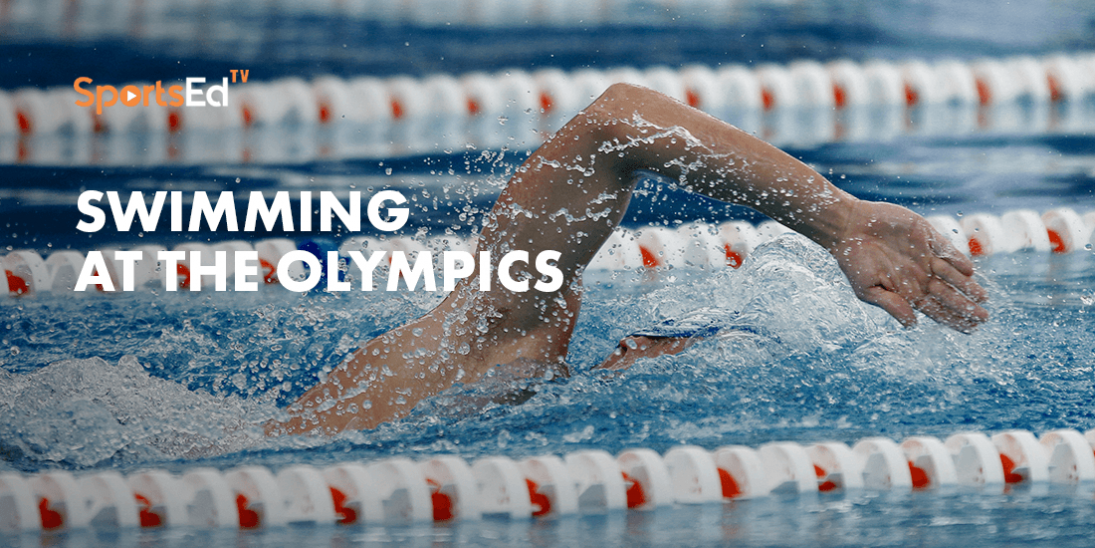Summer Olympics
Welcome and thanks for visiting...

Track and Field at the Summer Olympics

The Summer Olympics are the world's grandest stage for athletic competition, showcasing the finest athletes from across the globe.
Within this colossal event, the track and field competitions have stood out as the most storied and electrifying sports since 1898.
SportsEdTV offers the Olympic track and field history, highlights essential rules and formats, discusses the rigorous qualification process, and introduces some of the best athletes to have graced this prestigious event and available Olympic event records.
Olympic History of Track and Field
Track and field events have been an integral part of the modern Olympic Games since their inception in 1896. The inaugural Olympics in Athens featured a modest program of track and field events for men only, including sprints, middle-distance runs, hurdles, and field events like the long jump and shot put.
Over the years, the number of events has expanded, showcasing an array of athletic talents.
The 1928 Amsterdam Olympics featured the first track & field events for women, marking the beginnings of gender equality in track and field. Events consisted of the 100m, 800m, 4x 100m relay, high jump, & discus. However, the 800m was dropped until 1960 since many of the female participants were unable to finish the race or fell ill. The games continued to evolve, introducing various races, throwing events, and jumping competitions, each requiring unique skills and abilities.
In 1912, the Stockholm Olympics introduced multi-events to the schedule. On the track and in the field, the men’s decathlon was added to the Olympic program. The ten events of this event include the 100m, long jump, shot put, high jump, 400m, 110m hurdles, discus, pole vault, javelin, & 1500m. American Jim Thorpe won the inaugural event. The women’s multi-event started as the pentathlon in 1964 with events of 80m hurdles, shot put, high jump, long jump, & 200m. In the 1984 Los Angeles Olympics, the women’s event changed to the heptathlon. The events include 100m hurdles, high jump, shot put, 200m, long jump, javelin, & 800m.
Track and field has produced legendary Olympians like Jim Thorpe, Jesse Owens, who stunned the world by winning four gold medals at the 1936 Berlin Olympics, Carl Lewis, Jackie Joyner-Kersee, and Usain Bolt, whose lightning-fast sprints set the track ablaze in the 21st century. These athletes have left an indelible mark on the Olympic history of track and field.
Important Rules and Formats
Track and field comprises a wide range of events, each governed by specific rules and formats. Here's a glimpse into some of the key aspects:
Track Events:
Sprints
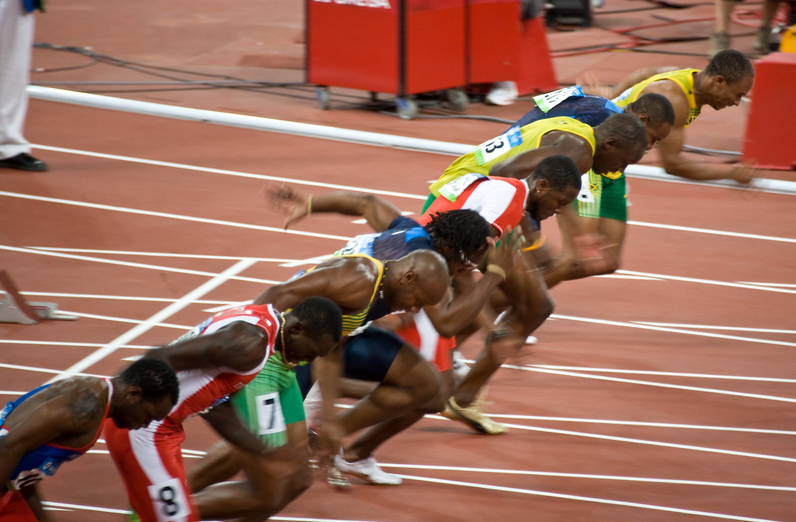
(100 meters, 200 meters, 400 meters):
Format: Athletes compete in separate lanes, and the first to cross the finish line wins.
Rules: False starts are penalized with disqualification after one false start. Athletes must stay in their lanes throughout the race.
Middle-Distance

(800 meters, 1500 meters):
Format: Athletes race around the track for the designated distance.
Rules: The runner who crosses the finish line first wins. Tactical positioning and timing are crucial, as these races often involve strategy and pacing. In the 800m, runners will start in lanes and then move to the inside lanes at a designated place on the track.
Long-Distance
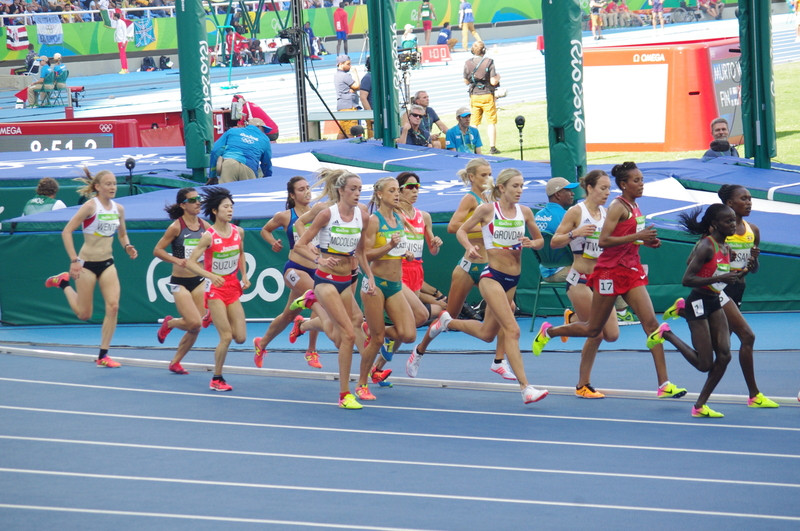
(5000 meters, 10,000 meters):
Format: Athletes run multiple laps around the track.
Rules: Like middle-distance races, the first athlete to finish wins. Stamina and endurance play a significant role in these events. Pacing and strategy also affect the placing. Runners don’t run in lanes in these events. They do try to stay close to the curb as that will be the shortest distance.
Hurdles
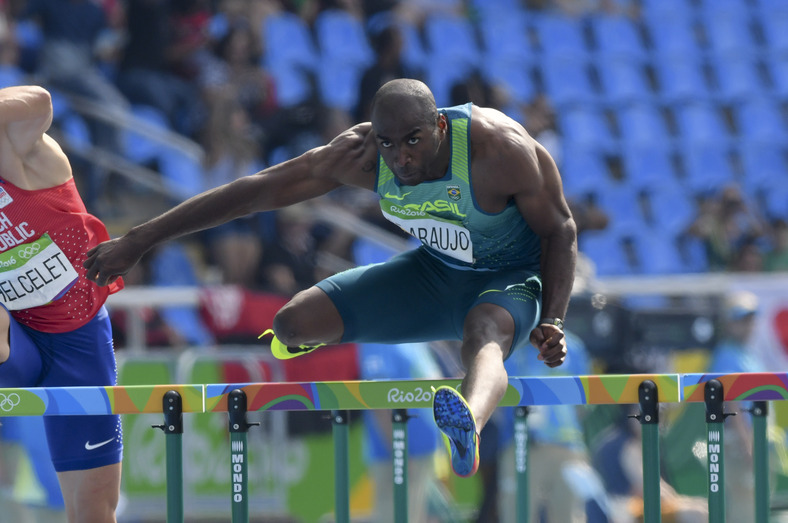
(110 meters/100 meters, 400 meters):
Format: Athletes run and jump over hurdles placed on the track at set distances.
Rules: There are specific rules for hurdlers as they must go over the hurdle in their lane. They can’t push the hurdle over or go around it. In the 400m hurdles, athletes’ legs must clear the center of the hurdle and not swing either leg around the hurdle. If they unintentionally knock a hurdle over and stay in their lane, they can keep racing; however, it probably will slow them down and/or lead to a disqualification.
Steeplechase
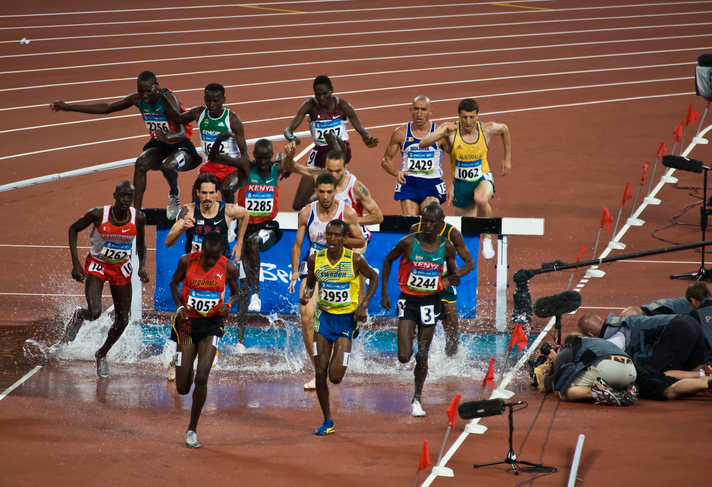
(3000 meters):
Format: Athletes run while clearing barriers and have a water jump to clear.
Rules: Barriers must be cleared, and athletes must negotiate the water jump, which is deeper than it looks. If they fall over any barrier and/or the water jump, athletes can continue to race unless they run off the track or interfere with other runners.
Relays
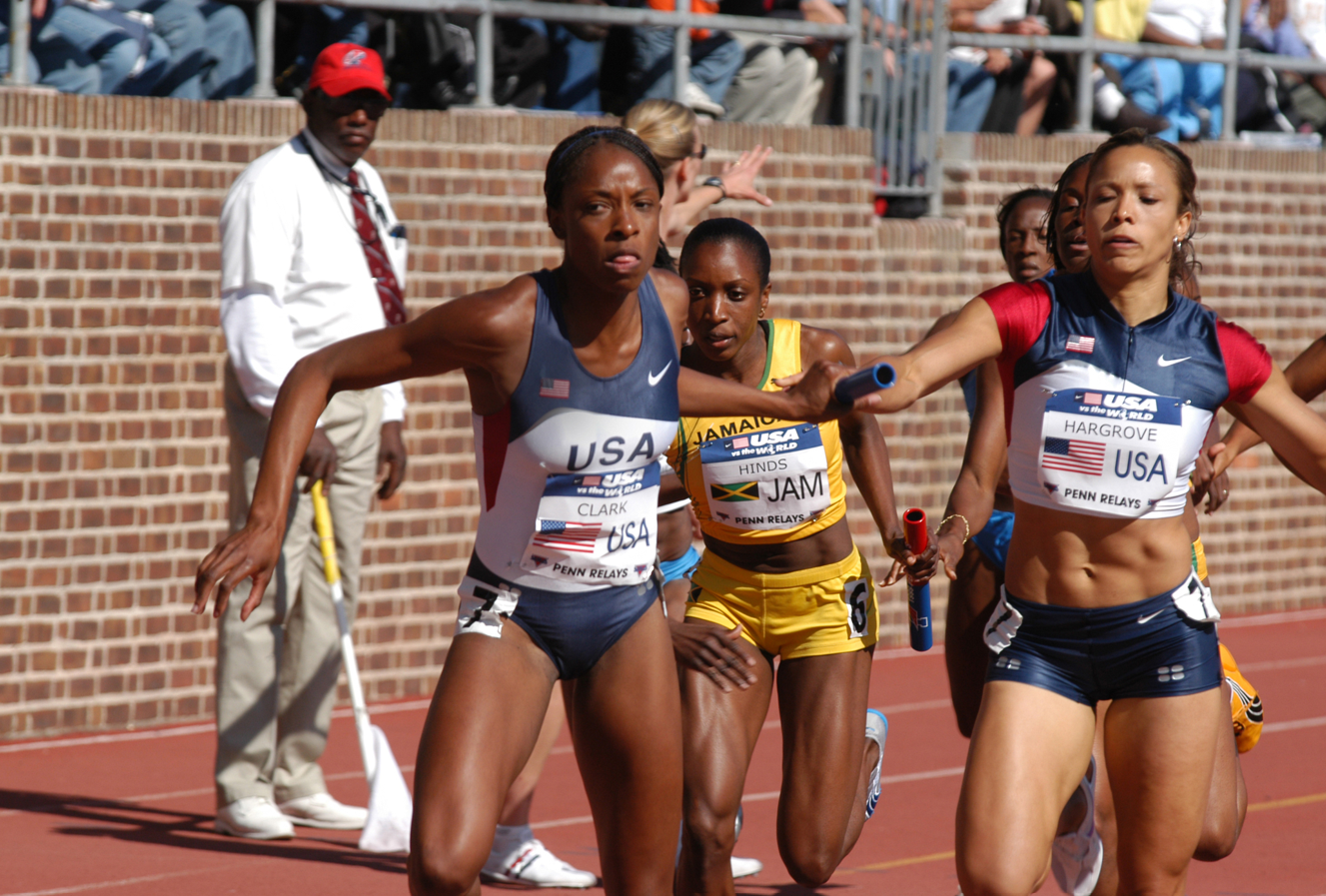
(4x100 meters, 4x400 meters, mixed 4 x 400 meters):
Format: Teams of four athletes each run a designated distance, passing a baton to the next runner.
Rules: Proper baton exchanges are crucial. Athletes must stay in their lanes and run in their assigned order. Disqualification can occur due to improper exchanges or lane violations. The mixed relay has two women and two men with the required order of man-woman-man-woman. The other relay rules are the same for the mixed 4 x 400m race.
Field Events
Horizontal Jumps
Long Jump and Triple Jump
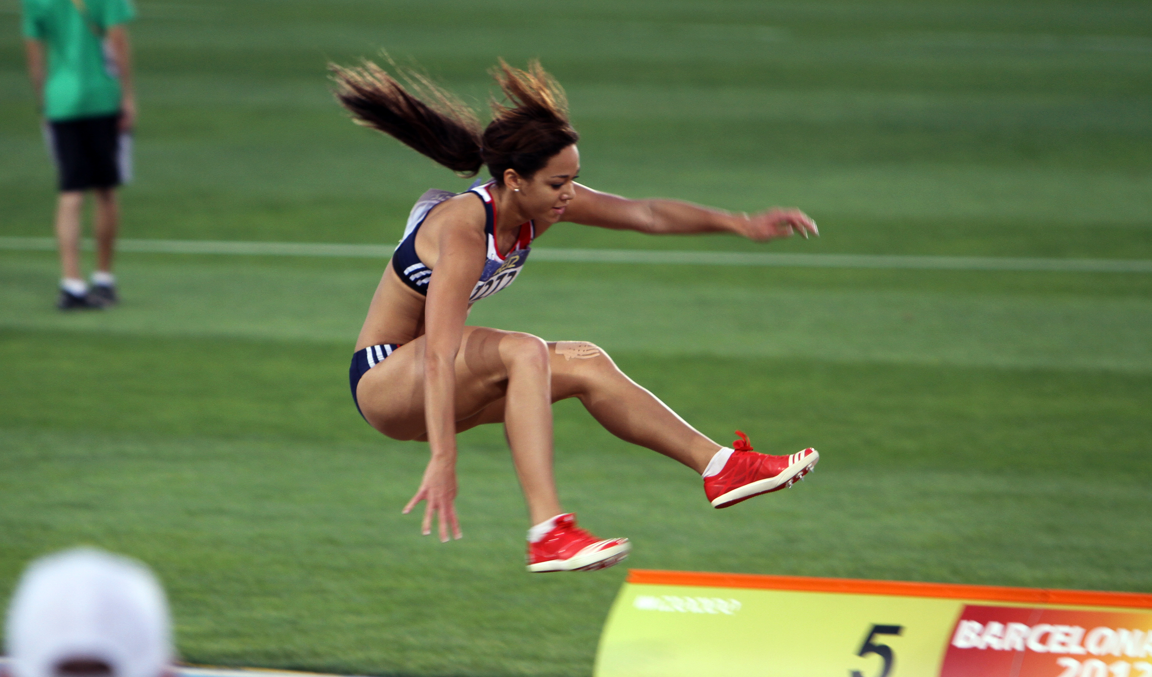
Format: Athletes sprint down a runway and take off from a take-off board, attempting to jump as far as possible in a sand pit.
Rules: The athlete's farthest jump (measured from the take-off board to the nearest mark in the sand) counts. Athletes must take off behind the board, which marks the foul line. Their shoe can’t break the plane of the take-off line, or the jump won’t be measured. Electronic measurement is used to determine a legal jump.
Vertical Jumps
High Jump and Pole Vault
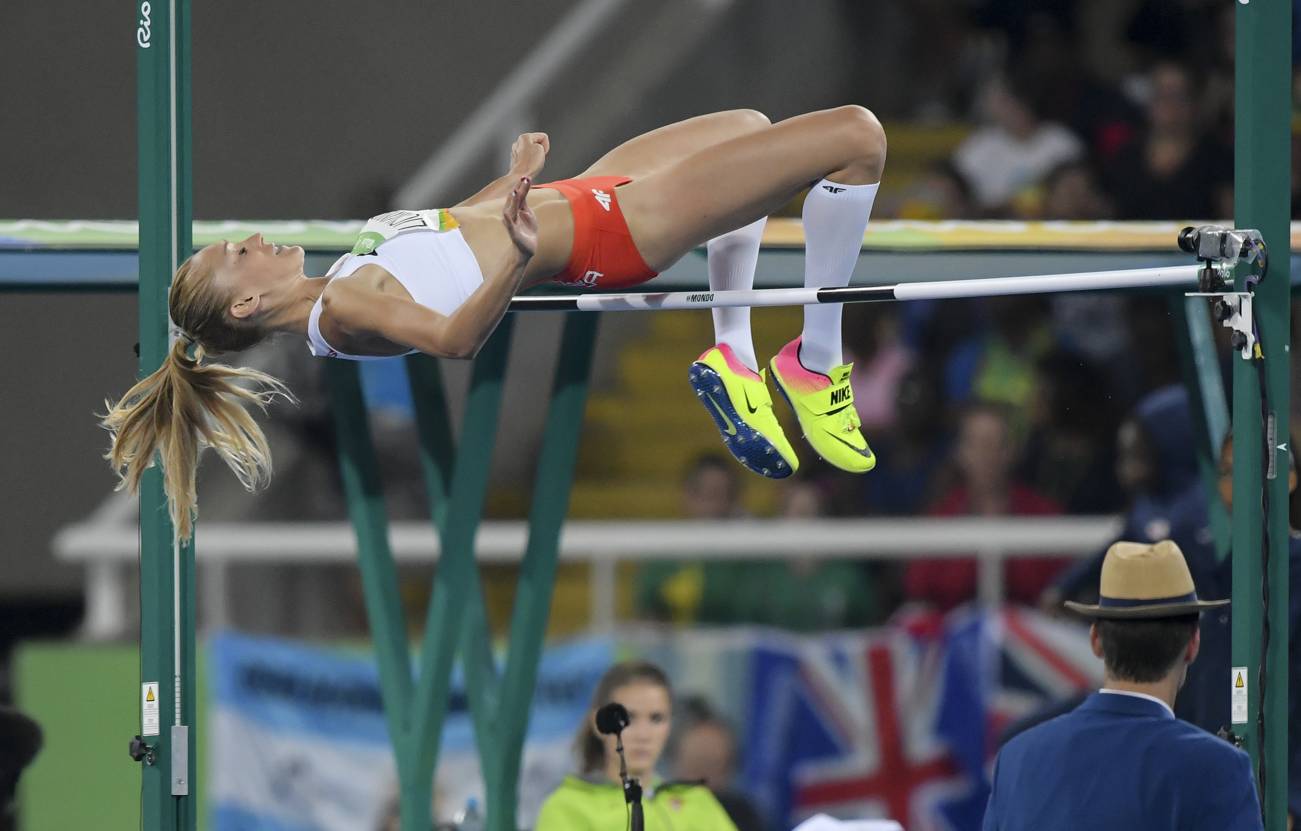
Format: Athletes attempt to clear a horizontal bar at increasingly higher heights.
Rules: Athletes have three attempts to clear the bar at each height. Knocking the bar down results in a failed attempt. In pole vault, athletes use a flexible pole to clear the bar. In the high jump, jumpers must take off on one foot.
Throws
Shot Put, Discus, and Hammer Throw
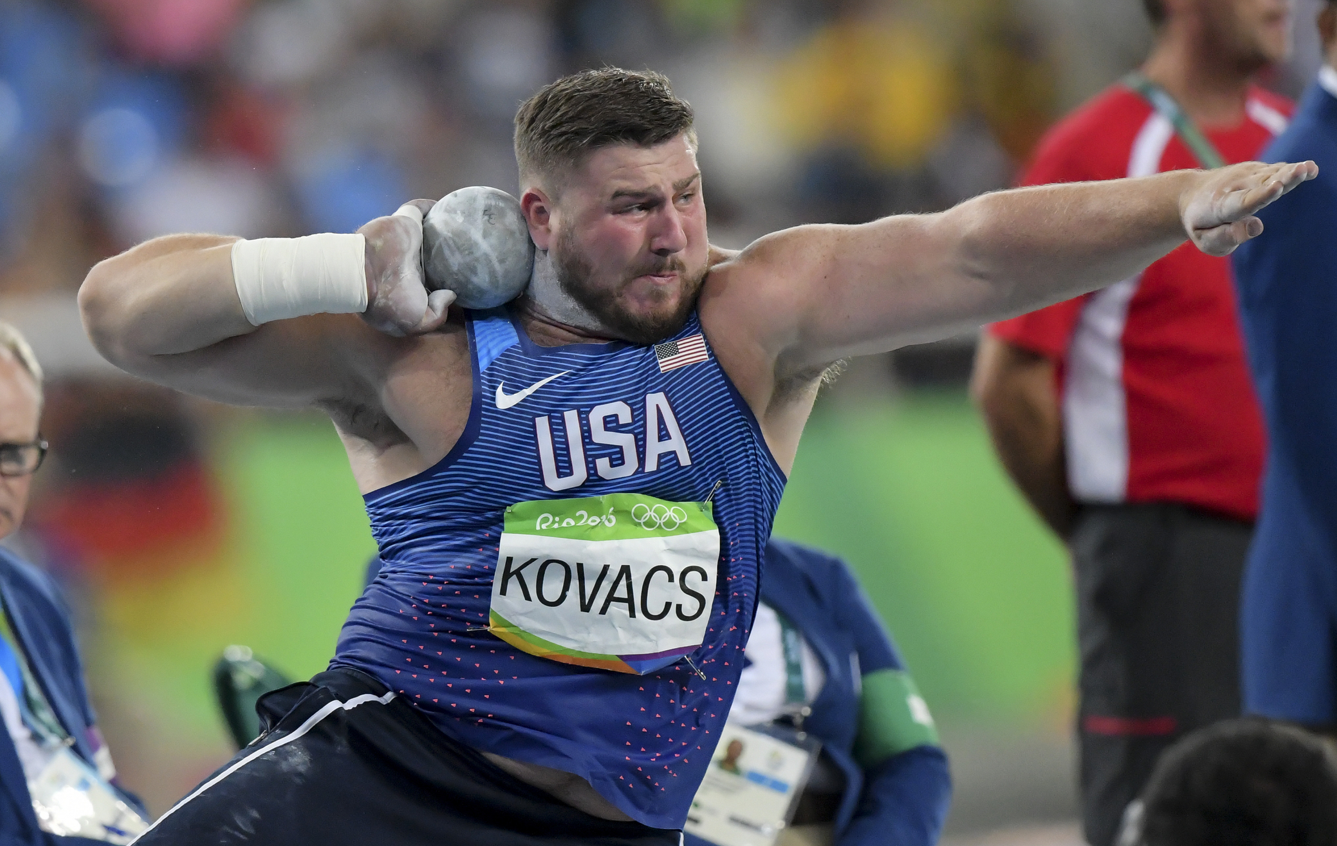
Format: Athletes throw heavy objects for a distance.
Rules: The farthest of 6 legal throw counts. Athletes must stay within a circle during the throw and use specific techniques for each event.
Javelin Throw

Format: Athletes throw a javelin (long spear) for distance.
Rules: The javelin athlete must release the javelin before the foul line at the end of the approach runway and not cross the line. The farthest legal throw is recorded.
All throw measurements are to the nearest centimeter.
Multi Events
Heptathlon and Decathlon:
Format: Heptathletes compete in seven events, while decathletes compete in ten events over two days.
Rules: Scoring is based on the athlete’s performance in each event, with points awarded for time, distance, or height. The athlete with the most points wins.
Heats
To accommodate many participants, most track events are often divided into heats or semifinals. However, the distance events (10.000m and Marathon) are run as finals only. Athletes compete in preliminary heats to qualify for the semifinals and, ultimately, the finals. The number of athletes advancing from each heat varies, ensuring the most competitive field in the final rounds.
Relays
Relay races, such as the 4x100 meters and 4x400 meters, involve teams of four runners passing a baton in a designated zone. Accurate baton exchanges and teamwork are vital for success, making relay events both thrilling and unpredictable. If the baton is dropped, the athlete who dropped it must pick it up and pass it off to avoid disqualification.
Records
Athletes strive to break world records in track and field, pushing the limits of human performance. The International Association of Athletics Federations (IAAF), now World Athletics (WA), oversees world records and ensures their authenticity.
Track Events
Sprints
100 meters:
Olympic Record (Men) - 9.63 seconds, set by Usain Bolt (Jamaica) at the 2012 London Olympics. Olympic Record (Women) - 10.61 seconds, set by Elaine Thompson Herah (Jamaica) at the 2020 Tokyo Olympics.
200 meters:
Olympic Record (Men) - 19.30 seconds, also set by Usain Bolt (Jamaica) at the 2008 Beijing Olympics. Olympic Record (Women) - 21.34 seconds, set by Florence Griffith-Joyner (USA) at the 1988 Seoul Olympics.
400 meters:
Olympic Record (Men) - 43.03 seconds, set by Wayde van Niekerk (South Africa) at the 2016 Rio Olympics.
Olympic Record (Women) - 48.25 seconds, set by Marie-José Pérec (France) at the 1996 Atlanta Olympics.
Relays
4x100m:
Olympic Record (Men) – 36.84 seconds, set by Jamaica at the 2012 London Olympics.
Olympic Record (Women) – 40.82 seconds, set by USA at the 2012 London Olympics.
4x400m:
Olympic Record (Men) – 2:55.39, set by USA at the 2008 Beijing Olympics.
Olympic Record (Women) – 3:15.17, set by the Soviet Union at the 1988 Seoul Olympics.
4x400 Mixed:
Olympic Record (Combined) – 3:09.87, set by Poland at the 2020 Tokyo Olympics.
Hurdles
110 meters Hurdles (Men):
Olympic Record - 12.91 seconds, set by Liu Xiang(China) at the 2004 Athens Olympics.
100 meters Hurdles
(Women):
Olympic Record - 12.26 seconds, set by Jasmine Camacho Quinn (Puerto Rico) at the 2020 Tokyo Olympics.
400 meters Hurdles (Men): Olympic Record – 45.94 seconds, set by Karsten Warholm (Norway) at the 2020 Tokyo Olympics.
400 meters Hurdles (Women): Olympic Record – 51.46 seconds, set by Sydney McLaughlin (USA) at the 2020 Tokyo Olympics.
Middle-Distance
800 meters: Olympic Record (Men) - 1:40.91, set by David Rudisha (Kenya) at the 2012 London Olympics.
Olympic Record (Women) - 1:53.43, set by Nadezhda Olizarenko (Soviet Union) at the 1980 Moscow Olympics.
1500 meters: Olympic Record (Men) - 3:28.32, set by Jakob Ingebrigtsen (Norway) at the 2020 Tokyo Olympics.
Olympic Record (Women) - 3:53.11, set by Faith Kipyegon (Kenya) at the 2020 Tokyo Olympics.
Long-Distance
3000-meter Steeplechase:
Olympic Record (Men) – 8:03.28, set by Conseslus Kipruto (Kenya) at the 2016 Beijing Olympics.
Olympic Record (Women) – 8:58.81, set by Gulnara Galkina-Samitova (Russia) at the 2016 Beijing Olympics.
5000 meter:
Olympic Record (Men) - 12:57.82, set by Kenenisa Bekele (Ethiopia) at the 2008 Beijing Olympics.
Olympic Record (Women) - 14:26.17, set by Vivian Cheruiyot (Kenya) at the 2016 Rio Olympics.
10,000 meter:
Olympic Record (Men) - 27:01.17, set by Kenenisa Bekele (Ethiopia) at the 2008 Beijing Olympics.
Olympic Record (Women) - 29:17.45, set by Almaz Ayana (Ethiopia) at the 2016 Rio Olympics.
Marathon:
Olympic Record (Men) - 2:06.32, set by Samuel Wanjiru (Kenya) at the 2008 Beijing Olympics.
Olympic Record (Women) - 2:23.07, set by Tiki Galana (Ethiopia) at the 2012 London Olympics.
Field Events
Horizontal Jumps
Long Jump:
Men's Olympic Record: 8.90 meters, set by Bob Beamon (USA) at the 1968 Mexico City Olympics.
Women's Olympic Record: 7.40 meters, set by Jackie Joyner-Kersee (USA) at the 1988 Seoul Olympics.
Triple Jump:
Men's Olympic Record: 18.09 meters, set by Kenny Harrison (USA) at the 1996 Atlanta Olympics.
Women's Olympic Record: 15.67 meters, set by Yulimar Rojas (Venezuela) at the 2020 Tokyo Olympics.
Vertical Jumps
High Jump:
Men's Olympic Record: 2.39 meters, set by Charles Austin (USA) at the 1996 Atlanta Olympics.
Women's Olympic Record: 2.06 meters, set by Yelena Slesarenko (Russia) at the 2004 Athens Olympics.
Pole Vault:
Men's Olympic Record: 6.03 meters, set by Thiago Braz da Silva (Brazil) at the 2016 Rio Olympics.
Women's Olympic Record: 5.05 meters, set by Yelena Isinbaeva (Russia) at the 2008 Beijing Olympics.
Throws
Shot Put: Men's Olympic Record: 23.30 meters, set by Ryan Crouser (USA) at the 2020 Tokyo Olympics.
Women's Olympic Record: 22.41 meters, set by Ilona Slupianek (East Germany) at the 1980 Moscow Olympics.
Discus Throw: Men's Olympic Record: 69.89 meters, set by Virgilijus Alekna (Lithuania) at the 2004 Athens Olympics.
Women's Olympic Record: 72.30 meters, set by Martina Hellmann (East Germany) at the 1988 Seoul Olympics.
Hammer Throw:
Men's Olympic Record: 84.80 meters, set by Sergey Litvinov (Soviet Union) at the 1988 Seoul Olympics.
Women's Olympic Record: 82.29 meters, set by Anita WÅodarczyk (Poland) at the 2016 Rio Olympics.
Javelin Throw:
Men's Olympic Record: 90.57 meters, set by Andreas Thorkildsen (Norway) at the 2008 Beijing Olympics.
Women's Olympic Record: 71.53 meters, set by Osleidys Menendez (Cuba) at the 2004 Athens Olympics.
Multi Events
Decathlon: 9018 points Damien Warner (Canada) 2020 Tokyo
Heptathlon: 7291 points Jackie Joyner Kersee (USA) 1988 Seoul Olympics
Race Walk
20 kilometer
Olympic Record (Men) - 1:18.46, set by Chen Ding (China) at the 2012 London Olympics. Olympic Record (Women) - 1:25.16, set by Qieyang Shijie (China) at the 2012 London Olympics.
Qualification for Track and Field
Earning a spot in the Olympic track and field competitions is a daunting challenge. Qualification typically involves achieving specific performance standards or winning national trials. National Olympic committees also play a role in selecting athletes to represent their respective countries.
Here is a Iink to qualification methods and standards
International Olympic Committee (IOC) Directory: The IOC maintains a directory of National Olympic Committees (NOCs) from around the world on its official website.
Here is the link to National Olympic Committees
Additionally, countries may earn quota places for specific events based on their performance at international competitions or the World Athletics rankings. This system ensures that the most talented and deserving athletes make it to the Olympic stage.
Legendary and Future Stars
Track and field has seen a plethora of legendary athletes, and future stars continue to emerge. Some of the standout athletes include:
Legends
Usain Bolt (Jamaica): The fastest man in history, Bolt's charisma and dominance in the 100 meters and 200 meters made him a global icon.
Allyson Felix (USA): Winning 11 Olympic medals makes her the most decorated USA performer. She was a factor in the long sprints and relays for five Olympics.
Florence Griffith-Joyner (USA): Known for her striking fashion and blistering speed, Griffith-Joyner set world records in the women's 100 meters and 200 meters in 1988.
Carl Lewis (USA): Lewis won multiple gold medals in sprints and long jump and was a symbol of American track and field excellence.
Bob Mathias (USA): Youngest Gold Medalist in a track and field event, winning the decathlon at age 17 during the London 1948 Games. He followed up at the 1952 Helinski Games.
Billy Mills (USA): Come from behind, surprise winner in 1964 in the men’s 10,000m race, Mills set a new Olympic record.
Paavo Nurmi (Finland): Nurmi set 22 world records and won 12 Olympic medals in the distance events in four Olympic Games.
Al Oerter (USA): A four-time Gold Medalist in the discus, Oerter was the first to win four consecutive golds in the same event despite several serious injuries and strong competition.
Joan Samuelson (USA): Winner of the first women’s Olympic marathon in 1984 despite knee surgery 17 days before the US Trials.
Jim Thorpe (USA): The first Native American to ever win a Gold Medal for the USA. He medaled in the decathlon & pentathlon. The King of Sweden called him “The World’s Greatest Athlete.” However, after the Games, it was discovered that he took payments to play semi-pro baseball and his medals were taken away. After many years of appeals, Thorpe was reinstated as the official victor in his events and his medals were returned.
Future Legends
Mutaz Barshim (Qatar): Still the most consistent high jumper in the world. Multi-Olympic medalist Barshim has come very close to the magic 8’ mark (2.45m) several times.
Ryan Crouser (USA): Mr. Shot Put is still breaking records every time he steps in the ring. He has seven of the top 10 throws of all time.
Armand (Mondo) Duplantis (Sweden): Multi-time world record holder Duplantis is soaring to new global standards meet to meet. He has six of the top 10 marks ever recorded.
Shelly-Ann Fraser-Pryce (Jamaica): Two-time Olympic champion and five-time world champion in the 100m, she seems to be on the podium whenever a major world championship meet is held. She has announced her retirement after the Paris Games.
Grant Holloway (USA): Holder of the second-fastest time in history in the 110m hurdles, Holloway has recorded a time of 12.81, just .01 off the world record. He’s a three-time World Champion in the event and an Olympic silver medalist. Indoors, he dominated the 60m hurdles and just reset the world record.
Shericka Jackson (Jamaica): The most versatile of the current Jamaican female sprinters, Jackson has scared the 200m world record while earning Olympic and World Championship medals in the 100m, 200m, 400m, 4 x 100m relay, and 4 x 400m relay.
Tia Jones (USA): Bursting on the international hurdle scene, Jones has tied the world record in the 60m hurdle mark. In the U20 division, she won several World Championships and Pan Am Games titles. She’s only 23 years old.
Eluid Kipchoge (Kenya): He is the dominant runner in the 5000m and marathon. He’s run some of the fastest times since the early 2000s and formerly held the world record in the marathon.
Noah Lyles (USA): Dominant from the 60m-200m, Lyles is continually improving in all phases of his race. He has said he wants to win gold in all sprints and relays. In addition, Lyles has announced he is pursuing world records in the 100m & 200m.
Elaine Thompson-Herah (Jamaica): Continuing Jamaica's sprinting tradition, Thompson-Herah has recently dominated the women's 100 meters and 200 meters. She has the second fastest 100m ever recorded by a female.
Sydney McLaughlin-Levrone (USA): She rewrote the 400m hurdles record book in 2021-2022. She is the first and only woman under 51.0 in the 400m hurdles. In 2023, she ventured into the open 400m and came within tenths of the American Record. She’s also a reliable 4 x 400 relay leg for the USA.
Sha’Carri Richardson (USA): She burst onto the world sprint scene as a college freshman, setting a new collegiate record of 10.75. In 2023, she won the 100m World Championship and was third in the 200m to establish herself as a sprinter to watch.
Yulimar Rojas (Venezuela): Rewriting the women’s triple jump lists has become common work for Rojas. A true competitor Roja has eight gold medals in Olympic & World Championships. She is “Queen of the Triple Jump.”
Karsten Warholm (Norway): The world record holder in the men's 400-meter hurdles, Warholm's technical prowess and raw speed have redefined his event. His domination of the event has been evident for several years and he is the only man to run under 46 seconds in the event.
In each Olympic cycle, new talents emerge, ready to etch their names in the annals of track and field history.
Track and field at the Summer Olympics encapsulates the essence of sport – raw athleticism, precision, and determination. From its humble beginnings in Athens to the world-renowned spectacle it is today, it continues to inspire generations of athletes and fans. As the Olympic Games continue to evolve, track and field will undoubtedly remain a focal point, celebrating the extraordinary capabilities of the world's finest athletes.







